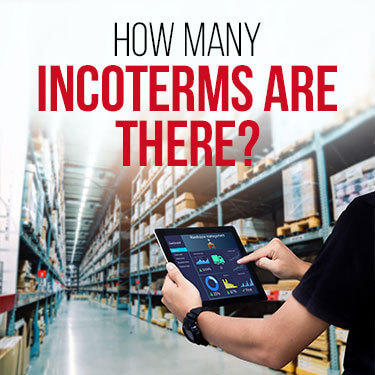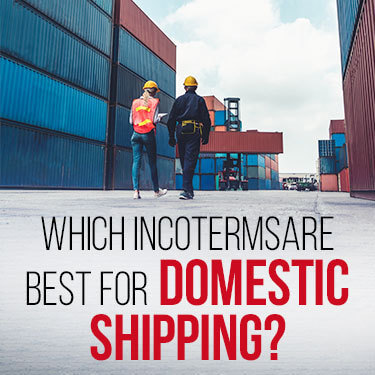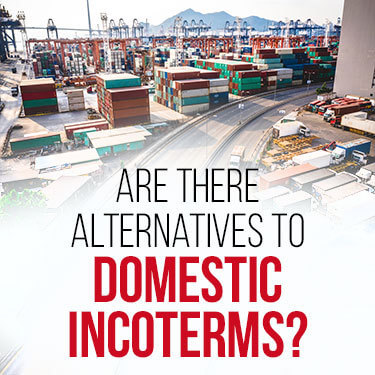Domestic Incoterms are shipping terms that domestic shippers in the U.S. are using at an increasing rate. While they can be challenging to understand at first, the domestic version of Incoterms helps shippers and receivers in numerous ways.
Created by the International Chamber of Commerce (ICC), domestic Incoterms are used by sellers and buyers to understand one another better when conducting a transaction. The domestic version of Incoterms leaves out many of the international aspects of a sale and leaves in the aspects that are relevant to a domestic shipment.
Domestic Incoterms are extremely useful, but have various details surrounding them. We’ll show you how Incoterms for domestic shipping work and how to use them to your advantage.
Incoterms (international commercial terms) were created by the ICC to help buyers and sellers in different countries to better understand one another when conducting international transactions and shipments. Due to the various language and cultural boundaries between different nations, it can be difficult for buyers and sellers to understand each other.
Incoterms were designed to help avoid that confusion by clearly explaining the responsibilities of buyers and sellers of an international transaction. Although Incoterms were originally designed to help with international transactions, many buyers and sellers within the U.S. have used them for their domestic shipments.

The ICC created 11 different Incoterms that can be used when conducting international transactions. By having multiple Incoterms to choose from, buyers and sellers can settle on terms that best suit their needs.
ICCs 12 Incoterms are as follows:
Every 10 years, the ICC reviews Incoterms and determines if any changes need to be made. This allows Incoterms to meet the needs of buyers and sellers in the modern day. For example, the 2020 Incoterms made some key changes to the older 2010 Incoterms.
The new features of 2020 Incoterms include:
Even though the ICC updates Incoterms every 10 years, buyers and sellers can still use older iterations of Incoterms as long as both parties agree to do so. This applies to domestic shipments as well.
Domestic buyers and sellers that want to use Incoterms for domestic shipments will need to take special care when picking the Incoterm they want to use for their transactions. Since Incoterms were meant for international trade, buyers and sellers will have to view Incoterms from a domestic perspective.
Certain parts of Incoterms rules will no longer be applicable when they’re used for domestic shipping. For example, Incoterms delegate the responsibility of customs clearance for export and import to the buyer and seller differently. The party who takes on this responsibility differs based on the Incoterm that’s used.
Domestic shipments don’t need to take this factor into consideration since the goods have already made it into the country. That said, there are responsibilities delegated by Incoterms that domestic buyers and sellers will still have to focus on.
These include:
Each of these factors is important for domestic buyers and sellers to consider when negotiating their transactions with one another.
Another concern that buyers and sellers should consider before picking an Incoterm for domestic shipping is determining their needs. Buyers and sellers have different interests in mind when conducting a transaction. This can make determining which Incoterms should be used very difficult.
To make choosing a domestic Incoterms easier, buyers and sellers should consider how much control they want to have over the shipment. Some Incoterms delegate more responsibilities to the seller while others delegate more responsibilities to the buyer. There are also Incoterms that balance out the responsibilities between the two parties very evenly.
Therefore, buyers and sellers should express their needs to one another and then compromise on an Incoterm that satisfies both parties.
One important factor that domestic buyers and sellers will need to be on the lookout for is what mode of transportation the Incoterm that they choose covers. Certain Incoterms can be used for all modes of transportation, while others are only applicable for ocean and inland waterway transport.
For truckload shipments, buyers and sellers should look to the Incoterms that cover all modes of transport such as:
These Incoterms are a great place for buyers and sellers to start if they want to use dry van truckload shipping or some other truck-based service to move their goods.

As we’ve established, there are numerous Incoterms for domestic shipping that buyers and sellers can choose from. However, some domestic Incoterms are better suited for shipments within the U.S. than others. We’ve identified some Incoterms that are the most useful and explained why they should be used.
The first reason that FCA (Free Carrier) is great for domestic shipping is that it can be used for any mode of transportation. This means that shipments transported by truck can use this Incoterm. FCA places most of the responsibility for the shipment on the buyer.
When this Incoterm is used for domestic shipping, buyers and sellers receive the following benefits:
For international transactions, FCA would require sellers to take care of exportation proceedings for their goods. However, sellers don’t have to take care of this responsibility when FCA is used for domestic shipments.
This means that the seller only needs to make the goods they’ve sold available for pickup by the buyer’s carrier. Although buyers have more responsibility placed on them by the FCA Incoterm, there are certain responsibilities they won’t have to fulfill. Similar to the seller, buyers won’t need to worry about taking care of the customs formalities associated with importing.
However, buyers will have to take responsibility for the logistical aspects of the shipment. Buyers will be able to pick a carrier and shipping option that works best for their needs.
DDP (Delivered Duty Paid) is an Incoterm that’s very similar to the FCA Incoterm. What sets them apart is that DDP places most of the shipment responsibilities on the seller rather than the buyer of the goods. Essentially, DDP is the complete opposite of the FCA Incoterm. Therefore, sellers have more control over the shipment instead of the buyer.
Two responsibilities the seller won’t have to worry about when using this Incoterm for domestic shipments include:
With these two responsibilities out of the way, the seller can pick a carrier and shipping option of their choosing.
For domestic buyers and sellers that are concerned about insuring their goods while they’re in transit, CIP (Carriage and Insurance Paid To) is an Incoterm that they should explore. When CIP is used for international shipments, the seller is responsible for export formalities while the buyer is responsible for importation formalities. Fortunately, neither buyer nor seller will have to worry about these responsibilities when this Incoterm is used for a domestic shipment.
The seller will only have to focus on the following:
The buyer only has to receive the goods when they arrive. Freight insurance is the main provision that makes this Incoterm appealing when using it for domestic shipments. There are many dangers that freight can be exposed to when traveling domestically as the table below shows.
| Amount of Boxes That Arrive Damaged | 10 Percent |
| Amount Lost Due To Theft | $15 to $30 Million |
| Amount of Packages Lost Each Day | 1.7 Million |
Provided by: Business Insider, Freight Waves and Premier Packaging
Having insurance on goods will ensure compensation if a shipment falls victim to a disaster. We have an article on how to reduce transit damage that will help you better protect your shipment.

Incoterms aren’t required, regardless of whether they’re used for international or domestic shipping. Therefore, buyers and sellers are able to choose other options when working out the details of a domestic shipment.
One popular option is to use the domestic FOB trade term. While the ICC allows importers and exporters to use FOB for international shipments, shippers within the U.S. use their own version of this Incoterm@ for domestic purposes. The U.S. version of FOB has a few different variants that shippers can choose from.
These variants include the following:
Based on the needs of buyers and sellers, one of these domestic FOB variants will be able to meet their needs. The domestic FOB also allows freight to be shipped using any mode of transportation.
When it comes to moving freight domestically, you’ll need the right shipping documents. Our article on documents required for domestic shipping will show you what you’ll need.
At Truckload USA, we can help you ship just about any type of freight that you need to move. As a 3PL provider, we have connections with various small carriers all over the country who can move your freight from one point to the next.
The shipping services we provide at Truckload USA include:
No matter what type of freight you need to transport, our team of carriers are able to move it. If you’re ready to ship your freight, then fill out your quote below or give us a call at (866) 353-7178 for further assistance.
R+L Global Logistics
315 NE 14th St., Ocala, FL 34470